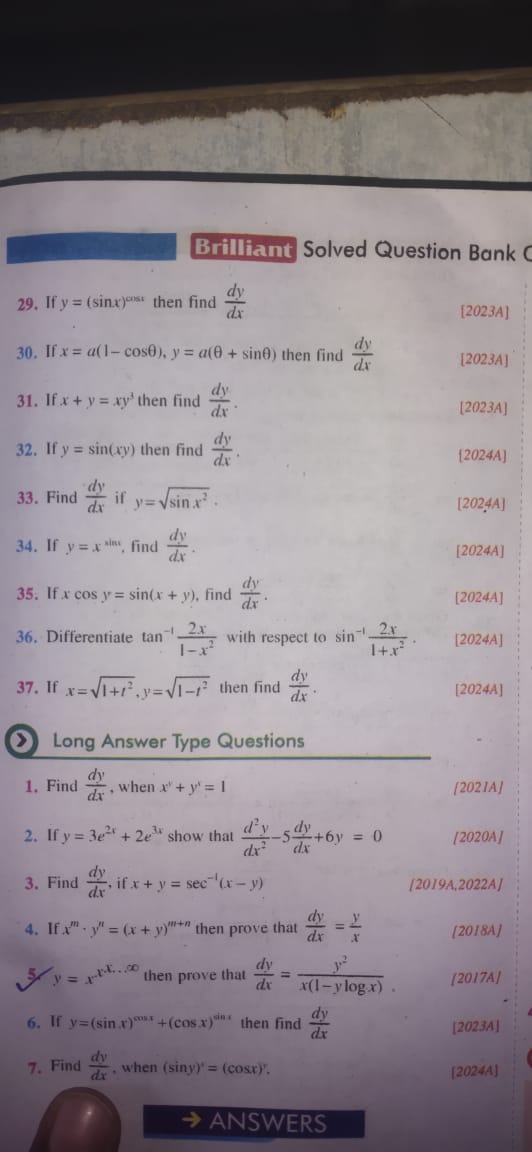If y = x^x log x then prove that dy/dx = y/x(1-y log x)

Understand the Problem
The question is asking for the derivative of the function given in the form y = x^x log(x) and then to prove a specific relationship involving that derivative. This requires both differentiation and some algebraic manipulation to show the desired result.
Answer
The derivative is \[ \frac{dy}{dx} = x^x \log(x) \left( \log(x) + 1 + \frac{1}{x \log(x)} \right) \]
Answer for screen readers
The derivative is
[ \frac{dy}{dx} = x^x \log(x) \left( \log(x) + 1 + \frac{1}{x \log(x)} \right) ]
Steps to Solve
- Differentiate the function using logarithmic differentiation
Start with the function given as ( y = x^x \log(x) ). To differentiate, use logarithmic differentiation.
Take the natural logarithm on both sides:
[ \log(y) = \log(x^x \log(x)) ]
This simplifies to:
[ \log(y) = x \log(x) + \log(\log(x)) ]
- Differentiate both sides
Differentiating both sides with respect to ( x ) gives:
[ \frac{1}{y}\frac{dy}{dx} = \frac{d}{dx}(x \log(x)) + \frac{d}{dx}(\log(\log(x))) ]
For the first term, use the product rule:
[ \frac{d}{dx}(x \log(x)) = \log(x) + 1 ]
For the second term, the derivative of ( \log(\log(x)) ) is:
[ \frac{1}{\log(x)} \cdot \frac{1}{x} ]
Thus, we have:
[ \frac{1}{y}\frac{dy}{dx} = \log(x) + 1 + \frac{1}{x \log(x)} ]
- Solve for ( \frac{dy}{dx} )
Multiply both sides by ( y ):
[ \frac{dy}{dx} = y \left( \log(x) + 1 + \frac{1}{x \log(x)} \right) ]
Now substitute back ( y = x^x \log(x) ):
[ \frac{dy}{dx} = x^x \log(x) \left( \log(x) + 1 + \frac{1}{x \log(x)} \right) ]
- Prove the relationship involving the derivative
To prove the specific relationship ( \frac{dy}{dx} = \frac{y}{x (1 - y \log(x))} ):
Substituting ( y = x^x \log(x) ):
[ \frac{dy}{dx} = \frac{x^x \log(x)}{x \left( 1 - x^x \log(x) \log(x) \right)} ]
Using algebraic manipulation and simplification, show that the right-hand side matches our previous expression for ( \frac{dy}{dx} ).
- Simplify the expression
This involves verifying that both expressions equate in the context where ( \log(x) ) and ( y ) terms align correctly.
The derivative is
[ \frac{dy}{dx} = x^x \log(x) \left( \log(x) + 1 + \frac{1}{x \log(x)} \right) ]
More Information
This problem uses logarithmic differentiation, which is useful for differentiating functions involving products and powers. The result shows how the derivative can be expressed in terms of the original function ( y ).
Tips
Common mistakes include:
- Forgetting the product rule when differentiating ( x \log(x) ).
- Misapplying properties of logarithms leading to incorrect simplification.
- Not replacing ( y ) correctly when finalizing the expression.
AI-generated content may contain errors. Please verify critical information